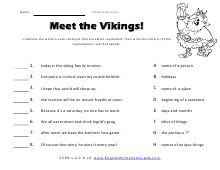Capitalizing Holidays, Products, and Geographic Names
There are some rules in the English language that need to be followed no matter what. Whenever you are writing academic essays or formal letters, these rules should be adhered to. Otherwise, it gives a very poor impression of your command over the language. There are several grammatical rules that are taught to young children so that they do not make mistakes in future. These rules help children throughout their lives when they have to write something in English.
One such rule is the rule of capitalization. Capitalization refers to the usage of a capital letter. There are rules that tell when to capitalize the first letter of the word. These rules imply that you should always capitalize the first letter of a proper noun. A proper noun could be anything ranging from a name to a geographical place. You should also use capitalization when you are starting a sentence. The first word of the sentence should be capitalized. The first word of a quote is also capitalized. Another rule of capitalization is to capitalize most of the words in a title. You also capitalize days and months.
In first, second, and third grade children are mostly given worksheets that test their memory of the rules of capitalization. Most of these worksheets contain questions related to capitalization of holidays, products, and geographical names.
Holidays
Whenever you spot any sort of holiday in a sentence, make sure to capitalize. Holidays are proper nouns and that is why they should start with capital letters. For example,
Christmas, Easter, New Year's, Memorial Day, Labor Day, etc.
Products
Brand names and their specific products should also be capitalized. For example,
Zara, Galaxy Note 5, etc.
Geographical Names
Geographical names are proper nouns and they should be capitalized. For example,
Arizona, Atlantic, Amazon, etc.
Our life experiences and the emotional state often drive what we believe and often help define our future. There are several types of questions that ask us to think outside of ourselves and work at the next level. If you were to be asked those questions, do you know how you would react? Our reaction to questions can often lead to an instant judgment of our disposition. In the worksheets you will find below we help you ponder and take to task these types of questions.
How to Use Experiences and Sources to Answer Questions?
In your academic life, you will encounter many questions that will seem almost impossible at first to answer. These types of questions might seem complex and difficult at first. They can make you believe that you do not have the potential or sources to answer them. However, with the right source, you can answer any question. One of your biggest sources for answering questions is your experience. You can use your past experience to answer any sort of question. Here are some ways through which you can use your experience and sources to answer questions.
Using Sources
Using sources can be a more authentic way to answer questions. Reliable sources can help in answering without any errors. Often, the question comes with the source itself. For example, many questions come from a paragraph given to you. You can look for the answers inside it. You can read the passage and navigate the answer easily. However, if there is no passage, then you can ask the teacher about the limitations. Some teachers allow you to use the reference of books while answering questions. You can also ask if you are allowed to use the help of the web. There is almost everything available on the web and it is the most authentic source for answering questions. If you are looking for something more reliable, then you can visit a nearby library. Books and articles from the library can be of a great source for answering questions.
Using Experience
If you have very limited sources for answering questions, then you can also use your own experience to answer questions. You can look for ways to relate the question with your own life. You can mention your experiences and personal emotions that you felt during those experiences. If you have things memorized in your head, you can also pour them down on the paper.

